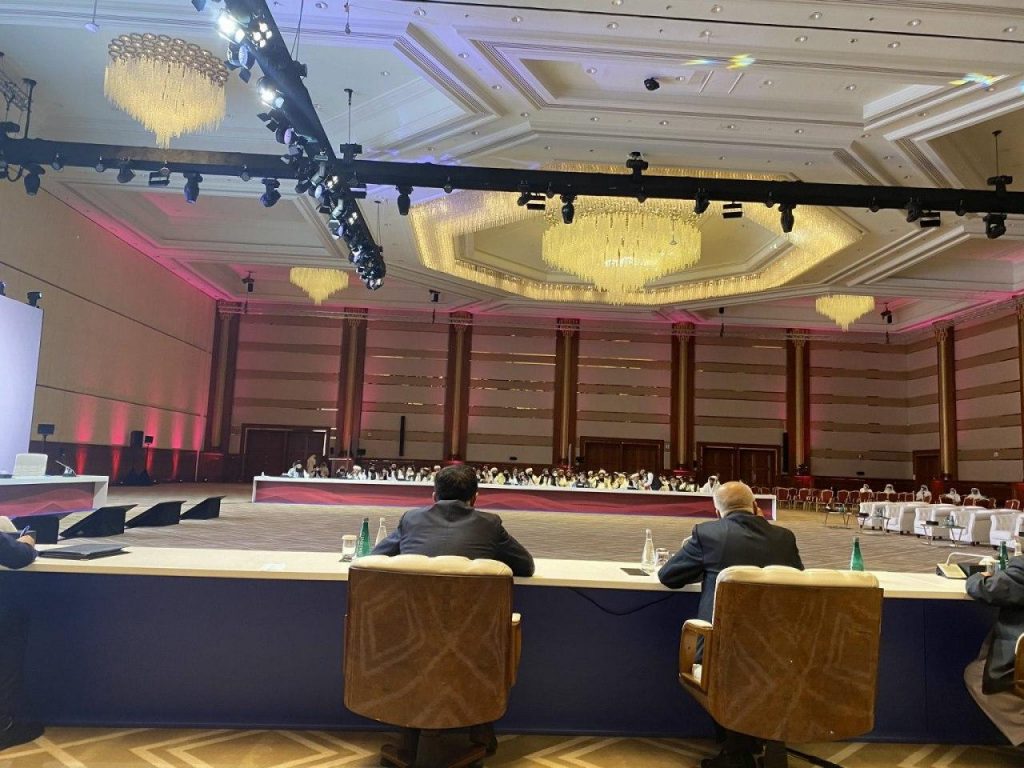What should be Basis of Talks; Has Peace Talks Reached Stalemate?
By Tahir Khan
Source: Daily Times
The Taliban and a government team opened negotiations in Qatar on Sept 12 but both sides have failed to reach an understanding on the working principles or practices in a month.
The slow pace of the peace process has strengthened the notion that the intra-Afghan negotiations could be long and complicated. Both sides will start discussions on the dialogue’s agenda whenever they agree on principles for negotiations. But no one knows when? Both sides are blaming each other for the stalemate.
US Special Representative for Afghanistan Reconciliation Zalmay Khalilzad-led team held talks with Pakistan’s Army Chief General Qamar Javed Bajwa in Rawalpindi on Thursday exploring ways how to push the peace process forward, sources aware of the meeting told Daily Times on Sunday. Khalilzad was accompanied by the top American commander in Afghanistan, General Scott Miller.
There was a consensus in the meeting at the General Headquarters to approach the Afghan government and the Taliban and share their suggestions to end the stalemate, according to the sources.
There are certain issues which have brought the talks to almost a standstill. The Taliban insist the Doha agreement must serve as the basis for the talks. But the Afghan government team opposes the proposal and argues Kabul was not part of the agreement and both sides should hold talks on their own terms.
Afghan government’s negotiators say if the Taliban insist on the Doha agreement, then Kabul also wants a declaration signed by the Afghan government with the US and NATO in Kabul on February 29, the same day when the Taliban and the US signed the agreement in Doha, should be the basis for the talks.
Some Afghan officials also wants decisions of the ‘Loya Jirga’ or grand assembly should also be considered in the talks that had allowed President Ashraf Ghani to release 400 Taliban prisoners that the Afghan government considered ‘dangerous’ in early August that had paved the way for the start of the intra-Afghan negotiations.
Ghani had in fact agreed to release 5,000 Taliban prisoners in accordance with the Doha agreement. Similarly, the Taliban also freed 1,000 government’s prisoners.
Meanwhile, a Taliban commentary says the Doha agreement, which contains the clause of intra-Afghan talks, has been endorsed by the United States, UN Security Council, Islamic conference, envoys of thirty-six nations, by Kabul and regional countries, and it becomes vital that this agreement lays the foundations for future phases.
The commentary titled “Why must Doha agreement serve as basis for current talks”, on a Taliban official website says it becomes one hundred percent legally binding on Kabul to accept this agreement as the basis for negotiations. Taliban also say they had rejected the “Loya Jirga” and other agreements from the very beginning and never accepted those as a basis, unlike Kabul that has endorsed and accepted the Doha agreement.
On Saturday, Afghanistan’s second vice-president, speaking in Kabul, accused the Taliban of creating a stalemate in the Qatar talks as the Taliban have raised unnecessary issues for the code of conduct for the talks.
Afghan officials say the Taliban are also demanding that the decisions in the talks should be on the basis of ‘Hanafi’ jurisprudence while the government team also wanted Jafari jurisprudence should be considered.
Masoom Stanekzai, Chief Negotiator of government Peace Negotiation Team, says that the peace talks in light of the Quran and Sunnah will have the desired results according to the wishes of people. “We appreciate Afghans’ patience for peace and an end to war. No one can stand against Afghans’ desires for peace. We’re committed to achieving lasting peace,” Stanekzai wrote on Twitter on Friday.
Amid a deadlock in Qatar, the Afghan government blames the Taliban for the spike in violence since both sides have opened talks on Sept. 12.
The Taliban spokesman Zabihullah Mujahid has rejected the government claim and says Taliban have neither attacked major cities nor tried to capture areas and military bases after the Doha accord. He also said the government forces have tried to enter their controlled areas.
